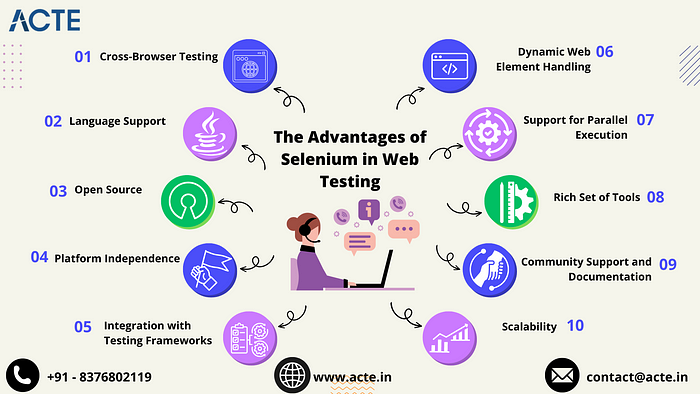Boosting Efficiency: Unveiling the Leading Benefits of Selenium for Web Testing
In the realm of software development, ensuring that web applications are robust, responsive, and user-friendly is paramount. This highlights the significance of web testing, an essential phase in the software development lifecycle aimed at scrutinizing the aspects of quality, performance, and reliability of web applications. Enter Selenium - a powerful, versatile web testing tool that has become synonymous with efficiency and efficacy in automating browser tasks. Without question! For those seeking firsthand Selenium experience, enrolling in Selenium Training in Chennai is an excellent choice. This comprehensive exploration delves into the multifaceted benefits of Selenium for web testing, revealing how it enhances efficiency and fosters the development of superior web applications.

Cross-Browser Compatibility
One of the most lauded strengths of Selenium is its innate capability to provide seamless cross-browser compatibility testing. In today's digital era, where users access web applications from a myriad host of browsers including Google Chrome, Mozilla Firefox, Safari, and Edge among others, ensuring consistent application performance across these platforms is crucial. Selenium effortlessly automates these tests, running scripts on multiple browsers concurrently, which not only saves time but also guarantees a uniform user experience across all browser environments.
Open Source Advantage
At the heart of Selenium's widespread adoption and success is its open-source nature, making it freely available to individuals and enterprises alike. This eliminates the financial barriers often associated with proprietary software, democratizing access to advanced web testing capabilities. The open-source model fosters an active community of contributors who continually enhance its features, fix bugs, and provide a substantial pool of resources and forums for user support and learning.
Language and Framework Flexibility
Selenium's support for various programming languages, including Java, Python, C#, Ruby, PHP, and JavaScript, provides testers and developers with the flexibility to write test scripts in the language they are most familiar or comfortable with. Furthermore, it integrates well with many testing frameworks such as TestNG, JUnit, PyTest, and more, offering a comprehensive testing environment. This versatility facilitates a smoother adaptation in diverse development environments and caters to a broader spectrum of testing requirements.
Parallel and Distributed Testing
Efficiency in testing is synonymous with reduced execution time without compromising coverage or quality. Selenium Grid empowers teams to execute parallel tests across different machines and browsers simultaneously. This ability significantly cuts down the time required for executing comprehensive test suites, accelerating the feedback loop and the overall development cycle. By leveraging parallel and distributed testing, organizations can scale their testing efforts efficiently and effectively manage the growing complexity and volume of tests.
Integration Ecosystem
Selenium's prowess extends into its compatibility with a spectrum of tools that enhance its functionality and efficiency. Its seamless integration with Continuous Integration (CI) and Continuous Deployment (CD) pipelines such as Jenkins, CircleCI, and Travis CI enables automated tests to be a part of the software delivery process, promoting faster releases with higher quality. Moreover, integrations with tools for version control, bug tracking, and cloud-based testing platforms like BrowserStack and Sauce Labs, augment Selenium's capabilities, enabling a more holistic and integrated approach to web testing.
Comprehensive Testing Capabilities
The versatility of Selenium extends beyond just functional testing to cater to various testing needs such as regression testing, smoke testing, and acceptance testing among others. Its potent combination of Selenium WebDriver and Selenium IDE (for record-and-playback of tests) equips testers to handle a spectrum of test scenarios from simple unit tests to complex integration and system tests. This comprehensive testing capability ensures that applications are rigorously vetted for issues before deployment, enhancing the quality and reliability of web applications.
Cloud-Based Testing Support
The shift towards cloud computing in software development and testing signifies a need for tools that can leverage cloud environments. Selenium’s compatibility with cloud-based testing platforms enables teams to access a vast array of browser and operating system combinations without the need for a large in-house infrastructure. This not only reduces the overhead costs associated with maintaining physical labs but also promotes scalability and accessibility, allowing testers to execute tests anytime, anywhere, further boosting efficiency.
Handling Dynamic Web Elements
Modern web applications are increasingly dynamic and complex, often featuring elements that change state based on user interaction or time. Selenium, equipped with advanced locator strategies and explicit wait commands, excels at interacting with and testing these dynamic web elements. This ability is indispensable for accurately simulating user interactions and validating application behavior under varied conditions.
Enhancing Test Development with AI
The frontier of web testing with Selenium is being expanded by integrating artificial intelligence (AI) and machine learning (ML) capabilities. These technologies offer promising avenues for enhancing test automation strategies, from intelligently generating and optimizing test cases to detecting visual regressions and analyzing test results. Although this is an emerging area, it signifies the potential for Selenium to evolve and remain pertinent in the face of changing technology landscapes. Sign up for Selenium Online Training right away to get started on the path to becoming a skilled Selenium tester!

In conclusion, Selenium embodies the quintessential tool for web testing, merging versatility, efficiency, and comprehensiveness. Its myriad benefits, from cross-browser compatibility, integration ecosystem, to support for dynamic web elements, make it an indispensable asset for developers and testers aiming to elevate the quality of their web applications. As we venture forward, Selenium’s openness to evolution and adaptability hints at an enduring relevance, continuously shaping the future of automated web testing.
Through meticulous examination and practical application, it becomes evident that Selenium not just simplifies the web testing process but significantly elevates efficiency, making it a cornerstone in the web development ecosystem. As digital experiences become increasingly central to businesses, Selenium stands as a beacon for quality assurance, guiding the development of applications that are not only functional but also robust and user-friendly.
